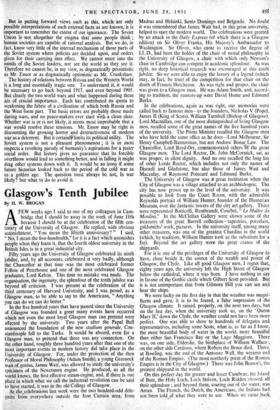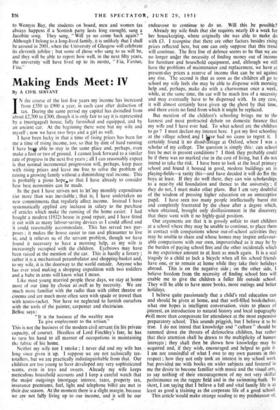Glasgow's Tenth Jubilee
By D. W. BROGAN FEW weeks ago I said to one of my colleagues in Cam- bridge that I should be away in the week of June 18th because I should be at the celebration of the fifth cen- tenary of the University of Glasgow. He replied, with obvious astonishment, "You mean the fiftieth anniversary?" I said, "No. I mean the five-hundredth," for it is a fact which astonishes people when they learn it, that the fourth oldest university in the British Isles is in a great industrial city. Fifty years ago the University of Glasgow celebrated its ninth jubilee, and, by all accounts, celebrated it very badly, although the Chancellor at that time was the most celebrated former Fellow of Peterhouse and one of the most celebrated Glasgow graduates, Lord Kelvin. This time no mistake was made. The organisation, the ingenuity, the splendour of the tenth jubilee was beyond all criticism. I* was present at the celebration of the third centenary of Harvard University. and I was proud, as a Glasgow man, to be able to say to the Americans, ` Anything you can do we can do better." In the five hundred years that have passed since the University of Glasgow was founded a great many events have occurred which not even the most loyal Glasgow man can pretend were affected by the university. Two years after the Papal Bull announced the foundation of the new studium generate, Con- stantinople fell to the Turks. It would be absurd, even or a Glasgow man, to pretend that there was any connection. On the other hand, roughly three hundred years after that one of the most important events in modem history did take place in the University of Glasgow. For, under the protection of the then Professor of Moral Philosophy (Adam Smith). a young Greenock man of genius, James Watt, was allowed to study the university's specimen of the Newcomen engine. He produced, as all the world knows, the first effective steam-engine, and, if there is one place in which what we call the industrial revolution can be said to have started, it was in the old College of Glasgow. At the celebrations last week were the two hundred-odd dele- gates from everywhere outside the Iron Curtain area, from Madras and Helsinki. Santo Domingo and Belgrade. No doubt it was remembered that James Watt had, in this great university, helped to start the modern world. The celebrations were greeted by an attack in the Daily Express (of which there is a Glasgow edition) on Sir Oliver Franks, His Majesty's Ambassador to Washington. Sir Oliver, who came to receive the degree of LL.D.. had been the holder of the chair of moral philosophy in the University of Glasgow, a chair with which only Newton's chair in Cambridge can compete in academic splendour. As was right, no deep historical research was encouraged at this tenth jubilee. So we were able to enjoy the luxury of a legend (which may, in fact, be true) of the competition for that chair on the death of Francis Hutcheson. As was right and proper, the chair was given to a Glasgow man. He was Adam Smith, and, accord-, ing to tradition, the runners-up were David Hume and Edmund Burke.
In the celebrations, again as was right, our memories were called back to famous men—to the founders, Nicholas V (Pope), James II (King of Scots). William Turnbull (Bishop of Glasgow). Lord Macmillan. one of the most distinguished of living Glasgow men, recalled some of the great names of the five hundred years of the university. The Prime Minister recalled the Glasgow men who have held the same office as he does—Lord Melhourne. Sir Henry Campbell-Bannerman, but not Andrew Bonar Law. The Chancellor, Lord Boyd-Orr. commemorated others 46f the great Glasgow men. The Lord Rector. Dr. John McCormick, sat, as was proper, in silent dignity. And no one recalled the long list of other Lords Rector, which includes not only the names of Disraeli and Gladstone, but also those of James Watt and Macaulay, of Raymond Poincare and Edmund Burke.
The University of Glasgow was 2 great institution when the City of Glasgow was a village attached to an archbishopric. The city has now grown up to the level of the university. It was possible to look from the Court Room, with the admirable Reynolds portrait of William Hunter, founder of the Hunterian Museum, over the fantastic towers of the city art gallery. There were represented Botticelli, Rembrandt, Courbet, Le Maitre de Moulins." In the McClellan Gallery were shown some of the treasures of the great Burrell collection—tapestries, porcelain. goldsmiths' work, pictures. In the university itself, among many other treasures, was one of • the greatest Chardins in the world (which, by tradition, William Hunter took as the substitute for a fee). Beyond the art gallery were the great cranes of the shipyards. For it is one of the privileges of the University of Glasgow to have, close beside it, the source of the wealth and power Of - Glasgow, the Clyde. Like all good Glasgow men, I regret that, eighty years ago, the university left the High Street of Glasgow below the cathedral, where it was born. I have nothing to say in favour of the Gothic castle which Gilbert Scott provided. But it is not unimportant that from Gilmore Hill you can see and hear the ships. We were lucky on the first day in that the weather was magni- ficent and gave, it is to be feared, a false impression of the Glasgow climate. It rained, properly, on the next two days, but on the last day, when the university took us, on the 'Queen Mary II,' down the Clyde. the weather could not have been more perfect. One was able to show to hundreds of delegates and representatives, including some Scots, what is, as far as I know, the most beautiful body of water in the world, more beautiful than either San Francisco Bay or the Lago Maggiore. Them was, on one side, Elderslie, the birthplace of William Wallace ; on the other side Cardross, where Robert the Bruce died. There. at Bowling, was the end of the Antonne Wall, the western end of the Roman Empire. (The most northerly point of the Roman Empire is in the City of Glasgow.) There was John Brown's, the greatest shipyard in the world. On this perfect day the greater and lesser Cumbrae, the Island of Bute, the Holy Loch. Loch Striven, Loch Ridden showed all their splendour ; and beyond them, soaring out of the water, was Arran. The French, the Dutch, the Americans, the Indians had not been told.of what they were to see. When we came,back, to Wemyss Bay, the students on board, men and women (as always happens if a Scottish party lasts long enough), sang a Jacobite song. They sang. "Will ye no come back again?" Although I belong to a long-lived family, it is unlikely that I shall be around in 2001, when the University of Glasgow will celebrate its eleventh jubilee ; but some of those who sang to us will be. and they will be able to report how well, in the next fifty years, the university will have lived up to its motto. " Via, Verilas,



































 Previous page
Previous page